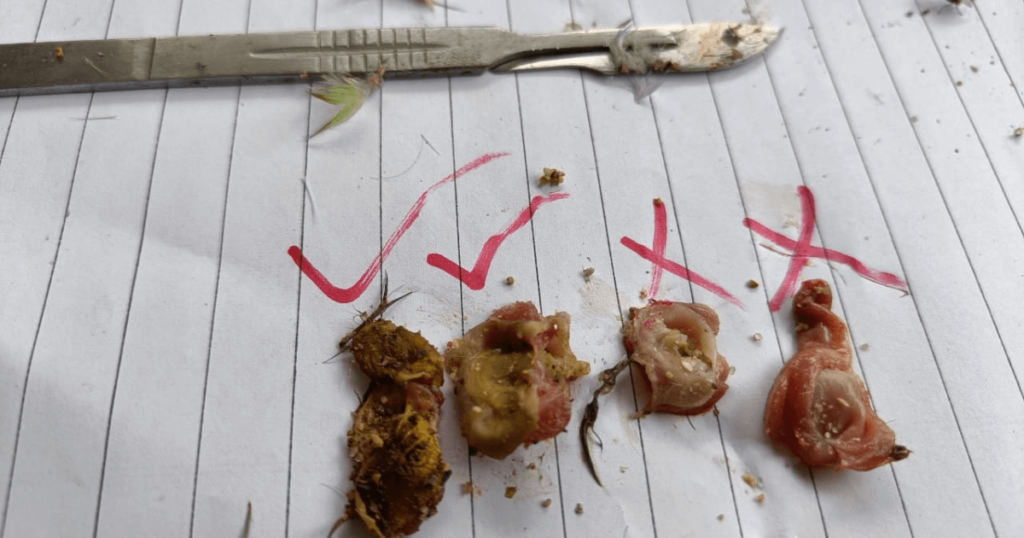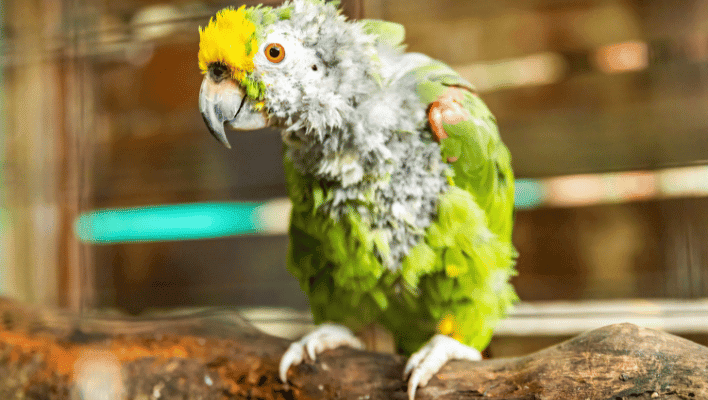Introduction
Birds frequently experience gastrointestinal illnesses, which can negatively affect their general health. Whether domesticated or wild, birds are prone to a number of gastrointestinal diseases brought on by bacteria, viruses, parasites, or fungi. To avoid problems and assure the bird’s recovery, these illnesses may present with a variety of symptoms and may necessitate urgent treatment. In-depth discussion of the causes, signs, and available treatments for gastrointestinal infections in birds will be covered in this extensive essay, giving you important knowledge about how to spot and effectively treat these infections.
Gastrointestinal Infections in Birds: Causes, Symptoms, and Treatment
Table of Contents
Birds are vulnerable to gastrointestinal infections because they were exposed to different infections that were in their environment. There are numerous potential causes of these infections, including:

- Bacterial Infections in Birds:Salmonellosis, colibacillosis, and campylobacteriosis are a few examples of the bacterial illnesses that commonly cause gastrointestinal infections in birds. Contaminated food, water, or contact with infected people can all lead to these diseases. Symptoms of bacterial infections in birds can include lethargy, sickness, loss of appetite, diarrhea, and weight loss.
- Viral Infections in Birds : The digestive tract of birds can also be harmed by viral diseases such as avian influenza, avian adenovirus, and avian rotavirus. Direct contact with diseased birds or exposure to polluted surfaces can both spread these viruses. Viral gastroenteritis in birds may manifest as digestive problems, respiratory problems, reduced egg production, and neurological symptoms.
- Parasitic Infections in Birds:Birds who have parasitic illnesses may experience digestive problems. These infections can be brought on by protozoa, helminths, or ectoparasites. Coccidia, giardia, roundworms, and mites are examples of common parasites. Infected birds may display signs include anemia, poor feather quality, anemia, weight loss, diarrhea, and increased susceptibility to other illnesses.
- Fungal Infections in Birds:Although less often, fungal infections can harm a bird’s digestive system. The usual fungal illness known as candidiasis, which is brought on by Candida spp., can induce gastrointestinal discomfort in birds. These infections frequently arise as a result of extended antibiotic use or a compromised immune system. Swallowing problems, regurgitation, crop stasis, and weight loss are possible symptoms.
Gastrointestinal Infections in Birds: Symptoms
For early detection and effective treatment, understanding the signs of gastrointestinal diseases in birds is essential. The following are some warning indicators to look out for:
- Digestion-related issues :Diarrhea, which can range from mild to severe in birds with gastrointestinal illnesses. The stool may smell strange, seem watery, have blood or mucus in it, or even appear to be watery.
- Appetite Loss and Weight Loss :A common sign of gastrointestinal illnesses in birds is a decrease in appetite. They might get leaner and lose weight as a result.
- Gagging and throwing up: It’s possible for birds with gastrointestinal diseases to vomit or regurgitate their meals. This can indicate digestive tract irritation or obstruction.
- Discomfort in the abdomen :Abdominal discomfort in birds may manifest as distension, soreness, or a hunched posture.
- Poor Quality Feathers: feather quality can result from gastrointestinal diseases, which can also impact a bird’s overall health. Feathers may have a dull or ragged appearance or exhibit symptoms of unusual shedding.
Treatment of Birds’ Gastro infections
To effectively manage gastrointestinal illnesses in birds, prompt treatment is essential. Depending on the underlying cause and the seriousness of the illness, the specific treatment strategy may change. Here are some typical medical options:
- Examination and diagnosis by a veterinarianIt is crucial to get medical help when a bird displays signs of a digestive ailment. Identification of the causal agent can be aided by a complete examination that includes a physical evaluation, fecal study, and diagnostic tests.
- Veterinarians may recommend the right medications to treat the infection depending on the diagnosis. Depending on the underlying cause, antibiotics, antivirals, antifungals, or antiparasitic medications may be used.
- Suppliant CareFor their recovery, birds with gastrointestinal illnesses may need supportive treatment. This can involve maintaining good nutrition, assuring access to hygienic food and drink, and creating a relaxing and stress-free atmosphere.
- IsolationTo stop the spread of the virus, healthy birds should be kept apart from infected ones. This is crucial in aviaries or homes with multiple birds.
Homeopathy Treatment from Aviterium Immunology
The holistic healing method of homeopathy has grown in acceptance in veterinary medicine, particularly the treatment of birds. It is founded on the idea that “like cures like” and makes use of extremely diluted materials derived from plants, minerals, or animals to promote the body’s natural healing process. In order to restore balance and general health, homeopathic treatments are specifically formulated for each patient based on their unique symptoms and constitution.
A variety of homeopathic remedies are available from Aviterium Immunology, including ones for gastrointestinal illnesses in birds. These remedies are designed to deal with the root causes and strengthen the bird’s immune system so it can fight off the sickness.Here are some of the homeopathic remedies that Aviterium Immunology suggests:
Nutri Boost
- Dosage: In the morning, add 5-6 drops of Nutri Boost to 100ml of water.
- Duration: Administer for 2 days.
Cocsi I Drop
- Dosage: In the morning, add 5-6 drops of Cocsi II to 100ml of water.
- Duration: Administer for 5 days.
Cocsi II Drop
- Dosage: In the evening, add 5-6 drops of Cocsi I to 100ml of water.
- Duration: Administer for 5 days.
Motion II Drop
- Dosage: In the morning, add 5-6 drops of Motion II to 100ml of water.
- Duration: Administer for 4 days.
Motion I Drop
- Dosage: In the evening, add 5-6 drops of Motion I to 100ml of water.
- Duration: Administer for 4 days.
Nutri Boost Drop
- Dosage: Every morning, add 5-6 drops of Nutri Boost to 100ml of water.
- Duration: Administer for 4 days.
Fit up Drop
- Dosage: Every morning, add 5-6 drops of Fit up to 100ml of water.
- Duration: Administer for 5 days.
It’s important to note that homeopathic treatments should be used in consultation with a qualified avian veterinarian or a homeopathic practitioner experienced in treating birds. They can assess the bird’s condition, provide a proper diagnosis, and recommend the most appropriate homeopathic remedies and dosages based on the specific needs of the bird.
Aviterium Immunology is dedicated to providing high-quality homeopathic treatments for avian health. Their expertise and experience in avian homeopathy make them a trusted source for treating gastrointestinal infections and other conditions in birds.
In the table, the “Product” column lists the name of each product. The “Dosage” column specifies the recommended dosage, which includes the time of administration (morning or evening) and the number of drops to be added to 100ml of water. The “Duration” column indicates the number of days the product should be given.
Frequently Asked Questions (FAQs)
- Can gastrointestinal infections in birds be transmitted to humans? – While the risk is generally low, practicing good hygiene is advisable when handling sick birds.
- How long does it take for a bird to recover from a gastrointestinal infection? – The recovery period varies based on the severity of the infection and the effectiveness of the treatment.
- Are there any natural remedies for treating gastrointestinal infections in birds? – Natural remedies can be used as complementary therapies, but consulting a veterinarian is essential for proper diagnosis and treatment.
- Can gastrointestinal infections in birds be prevented through vaccination? – Vaccination plays a crucial role in preventing certain viral infections, but consulting a veterinarian is necessary to determine the appropriate protocols.
- Can stress contribute to gastrointestinal infections in birds? – Yes, stress weakens the immune system, increasing the susceptibility to infections.
- Are all gastrointestinal infections in birds contagious? – The contagiousness depends on the specific pathogen, so necessary precautions should be taken to prevent the spread of infection.
Conclusion
Gastrointestinal infections in birds can be challenging to manage, but with the right knowledge and appropriate treatment, birds can recover and regain their health. Conventional treatments, as well as alternative approaches like homeopathy, offer options for managing these infections effectively. When considering homeopathic treatments, it’s essential to consult with a qualified professional to ensure the best care for your avian companions.
Remember, each bird is unique, and their response to treatments may vary. By understanding the causes, symptoms, and available treatment options, bird owners and enthusiasts can provide the necessary care and support for birds affected by gastrointestinal infections, ultimately promoting their well-being and recovery

